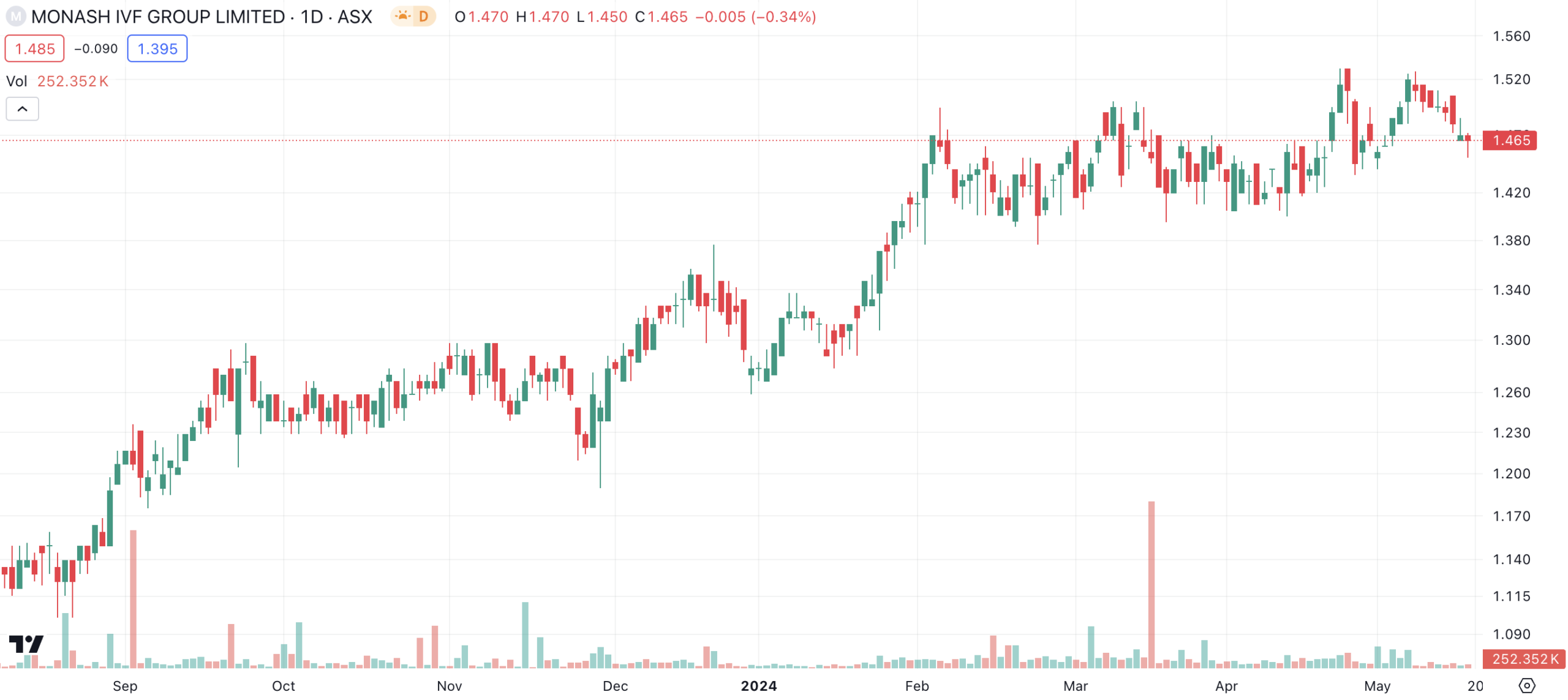Monash IVF (ASX:MVF): Emerging from a difficult 5 years better than ever
![]() Nick Sundich, May 23, 2024
Nick Sundich, May 23, 2024
In the 9 and a half years since fertility provider Monash IVF (ASX:MVF) listed, it has not been an easy journey. But we think the business has turned a corner and it is the subject of this week’s domestic stock deep dive!
Introduction to Monash IVF
Monash IVF was listed in May 2014 after being the fertility business of private equity group Ironbridge prior to that. It came less than 12 month after Quadrant’s infertility business Virtus Health listed and was one of the best listings of that year. Most private equity listings on the ASX tend to have short histories, are being flipped because private equity doesn’t think there’s more to come and know they can sell to retail shareholders who won’t question why they are selling.
This was not the case with Monash IVF. It was founded in 1971 and is the holder of several industry milestones including:
- The world’s first IVF pregnancy
- Australia’s first IVF birth (the third in the world at the time)
- The first frozen embryo birth
- The world’s first birth from donated eggs
- The first baby born from a vitrified egg
- Australia’s first pregnancy from ovarian tissue grafting
It is based in Victoria but has gradually expanded interstate over time and it has a presence in Malaysia too.
A difficult few years
You would think the IVF industry is a good space to be in given the high margins and significant demand. The Royal Australian College of General Practitioners estimated in early 2023 that infertility generally impacted 180m globally and one in six couple experienced infertility. This is happening for several reasons including that couples are having children at later ages.
It would also help to have such a good reputation with all the above milestones as well as a high success rate. But between 2017 and 2022, it was not. You see, Monash IVF is heavily reliant on referrals from other specialists. And there was one specific doctor who saw high volumes – Dr Lynn Burmeister.
Dr Burmeister’s departure to go out on her own was a blow to the company because many were alluding patients to the company because of her. Another blow came at its FY19 results in August 2019 when five Victorian based fertility specialists would no longer be using its services – a $1.5-$2.5m estimated hit to its profit.
Impacted by the pandemic
When the pandemic struck, non-urgent elective surgeries were suspended and even though the suspension didn’t last long, patients took a while to come back and there is further lag when completing fertility treatment. Monash IVF had to raise $80m in capital during the pandemic and fully draw down on a $115m debt facility. It was a big raise with 153.8m shares issued (63.2% of existing shares at the time) and it was conducted at a steep 26.8% discount to its 71c share price on the company’s last trading day before the deal.

Monash IVF (ASX:MVF) share price chart, log scale (Source: TradingView)
Even as fertility treatment levels returned to normal, things could have been better for Monash IVF. Its rival Virtus Health was acquired in 2022 and investors speculated that Monash IVF could be next.
Ultimately, it has not and this is unusual because as second in the market, it should have been first in line after Virtus. This is before you even considered its cheap multiples then and now. Instead, the third biggest company Genea was bought out and Monash IVF is now the only non-private equity owned operator of scale in its sector.
On the way back up
Monash IVF has just stuck to its business and FY23 was a great year. It delivered an 1% increase in revenues to $213.6m and a 15% jump in profit to $25.5m. This growth was delivered by a growth in market share and services as well as acquisitions and reopened fertility clinics (which were relocated post-pandemic). It closed the period with a 23.9% market share.
After a successful first half to FY24, the company is expecting a $29-30m profit, which would be a 14-18% increase from the year before. Revenue guidance was not given, but consensus estimates for FY24 expect $246.6m in revenue, a 15% increase. Looking to FY25, analysts expect $264.2m in revenue and a $31.1m profit, which would be up 7% and 5% respectively.
Valuation is quite compelling
Although Monash IVF has come a long way since the dark days of 2020, more than double what it raised capital at, the company still hasn’t reached pre-pandemic highs. Furthermore, it is trading at a P/E of just 16.8x for FY25 and a PEG of 1.2x. So, we think it is reasonable to expect that if Monash IVF can continue to grow as expected, it can deliver some good returns for shareholders. Our DCF valuation is $1.59, a 26% premium to the current share price. But we wouldn’t be surprised to see the dreams of it being bought out become a reality down the track. We’ve seen with Silk Laser Clinics (ASX:SLA) and Healthia (ASX:HLA) that if the public markets refuse to re-rate a company, the private markets will.
So, what are the risks?
The risks with this one are that it does not deliver the growth anticipated and that it becomes overburdened with debt. The company has made some progress but still has $39bn in borrowings and $55bn in lease liabilities while only having $8m in cash.
It it a good dividend stock? On a yield basis it certainly is up there with ~3.5% although it only paid out 4.4c per share for the full FY23. But is it a good growth stock? We think it is.
What are the best stocks to buy right now?
Check out our top stock picks
Blog Categories
Get Our Top 5 ASX Stocks for FY25
Recent Posts
Your invitation to the Freelancer Investor Day
Your invitation to the Freelancer Investor Day Freelancer (ASX: FLN) is a Sydney-based company that has been the subject of…
Kamala Harris stocks: If Joe Biden’s VP wins the White House in 2024, which stocks will win?
With the US Presidential election now certain to be a Kamala Harris v Donald Trump showdown, we’ve looked at so-called…
South32 (ASX:S32): Is it the dark horse amongst ASX 200 miners or have cyclones and commodity prices hit it too hard?
South32 (ASX:S32) began life as a spinoff from BHP back in 2015, capitalised at $9bn. In mid-2024, it is capped…



